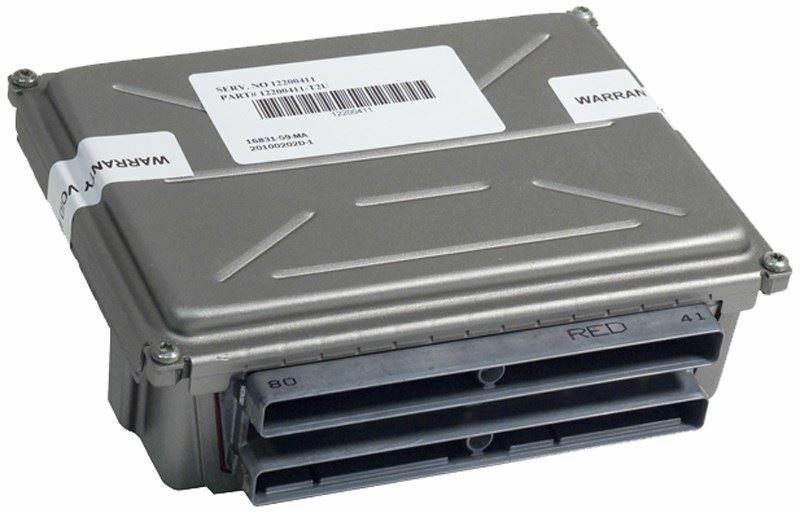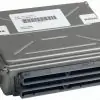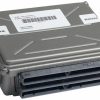Is Your 2004 GM Truck or SUV Running Rough?
If you’re dealing with frustrating issues like a persistent check engine light, intermittent stalling, poor fuel mileage, or a no-start condition in your 2004 Isuzu Ascender, Chevy Silverado, GMC Sierra, or other compatible GM vehicle, a failing Engine Control Module (ECM) is often the culprit. The ECM is the central computer of your vehicle’s powertrain, responsible for managing everything from fuel injection and ignition timing to transmission shifting. When it fails, it can cause a cascade of performance problems that can be difficult to diagnose.
From the Diagnostic Bay
We had a 2004 Silverado 1500 come into the shop with a complaint of random stalling at stoplights. No codes were stored, and the fuel pressure was perfect. After hours of chasing wires, we monitored the ECM data stream and noticed the ignition control signals would drop out just before the engine quit. We swapped in a known-good, programmed ECM, and the problem vanished. The original module had an internal fault that only appeared when it warmed up. A pre-programmed replacement like this one would have saved the customer significant diagnostic time and got them back on the road faster.
Common Symptoms of a Failing 2004 GM ECM
- ✔️ Persistent Check Engine Light (CEL) that won’t clear.
- ✔️ Engine cranks but refuses to start.
- ✔️ Unexplained stalling or rough, erratic idling.
- ✔️ Noticeable decrease in engine power and acceleration.
- ✔️ Poor fuel economy.
- ✔️ Harsh or incorrect transmission shifting.
- ✔️ Communication errors when using a diagnostic scan tool.
The Direct-Fit Solution for Your Vehicle
Don’t let a faulty computer keep your truck off the road. This is a direct replacement ECM, part number 12586242, which also replaces service numbers 19299226, 89017738, and others. We take the guesswork out of the repair by programming the module specifically for your vehicle using the VIN you provide at checkout. This ensures that all factory software and the latest GM updates are loaded, matching your vehicle’s specific options and emissions calibration. The result is a simple, plug-and-play installation process that restores factory performance and reliability.
This module is compatible with a wide range of 2004 GM trucks and SUVs equipped with 5.3L and 6.0L gasoline engines. Please verify that your original module carries one of the compatible service numbers listed below to ensure proper fitment.
Compatible Service Numbers: 12586242, 19299226, 89017738, YFKD, YFKF, YFKH, YFKJ, YFKX, YFXL, YFXM, YFXN, YFXP, YHTN
Frequently Asked Questions
Do I need to get this ECM programmed?
No. We handle the programming for you before shipment. Simply provide your vehicle’s VIN during or after checkout, and the module will arrive ready for installation with the latest GM software for your specific vehicle.
What is a security relearn procedure?
On many GM vehicles, after installing a new ECM, you may need to perform a simple security relearn procedure so the module can recognize your key’s anti-theft signal. This procedure typically involves turning the key to the ‘ON’ position for 10-15 minutes, then off, and repeating two more times. It requires no special tools and instructions are readily available online.
Where is the ECM located on my 2004 GM truck or SUV?
The location varies slightly by model. On trucks like the Silverado, Sierra, Suburban, and Yukon, it’s typically found on the driver’s side, under the battery tray. On SUV models like the Trailblazer, Envoy, and Rainier, it is usually located in the engine bay next to the air filter box.
How do I confirm this part is correct for my vehicle?
The best way is to check the service number on your original ECM. If it matches one of the numbers in our listing (e.g., 12586242, 19299226, etc.), this is the correct part for your vehicle.
Will this fix my vehicle’s problem?
This replacement ECM will correct issues directly caused by a faulty original module. While the symptoms listed are very common for ECM failure, it’s essential to have a proper diagnosis performed to rule out other potential causes like bad sensors, wiring issues, or fuel system problems.


